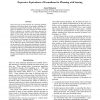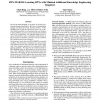120
click to vote
AIPS
2003
15 years 3 months ago
2003
There have been several proposals for expressing planning problems with different forms of uncertainty, including nondeterminism and partial observability. In this paper we invest...
121
Voted
AIPS
2006
15 years 3 months ago
2006
Temporally extended goals (TEGs) refer to properties that must hold over intermediate and/or final states of a plan. Current planners for TEGs prune the search space during planni...
132
click to vote
AIPS
2006
15 years 3 months ago
2006
We present a new algorithm for conformant probabilistic planning, which for a given horizon produces a plan that maximizes the probability of success under quantified uncertainty ...
144
Voted
AAAI
2006
15 years 3 months ago
2006
Temporally extended goals (TEGs) refer to properties that must hold over intermediate and/or final states of a plan. The problem of planning with TEGs is of renewed interest becau...
ESA
2008
Springer
15 years 4 months ago
2008
Springer
We consider a planning problem that generalizes Alcuin's river crossing problem (also known as: The wolf, goat, and cabbage puzzle) to scenarios with arbitrary conflict graph...
135
click to vote
AAAI
2008
15 years 4 months ago
2008
We describe HTN-MAKER, an algorithm for learning hierarchical planning knowledge in the form of decomposition methods for Hierarchical Task Networks (HTNs). HTNMAKER takes as inpu...
128
click to vote
AAAI
2007
15 years 4 months ago
2007
The world is unpredictable, and acting intelligently requires anticipating possible consequences of actions that are taken. Assuming that the actions and the world are determinist...
84
Voted
ECAI
1998
Springer
15 years 6 months ago
1998
Springer
The problem of minimally modifying a plan in response to changes in the specification of the planning problem has already been investigated in the literature. In this paper we cons...
132
click to vote
BIRTHDAY
2005
Springer
15 years 8 months ago
2005
Springer
abstract. In this paper we investigate a formalism for solving planning problems based on ordered task decomposition using Answer Set Programming (ASP). Our planning methodology is...
139
click to vote
ICTAI
2005
IEEE
15 years 8 months ago
2005
IEEE
In this paper, we study strategies in incremental planning for ordering and grouping subproblems partitioned by the subgoals of a planning problem when each subproblem is solved b...



